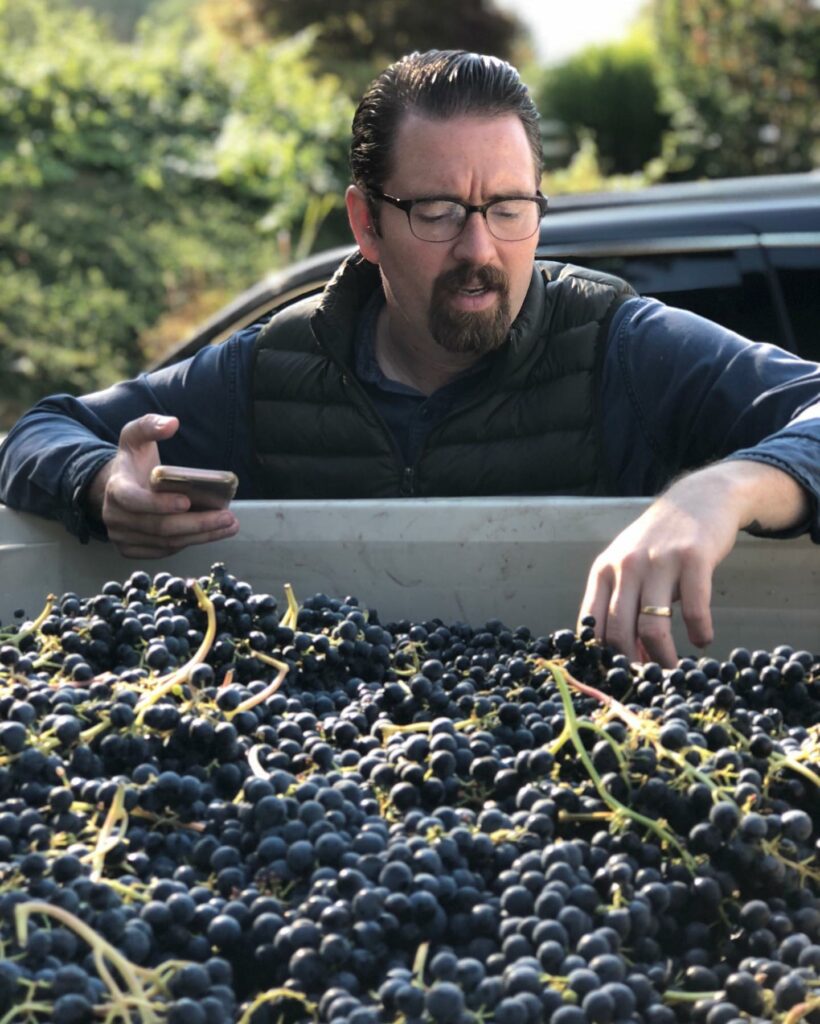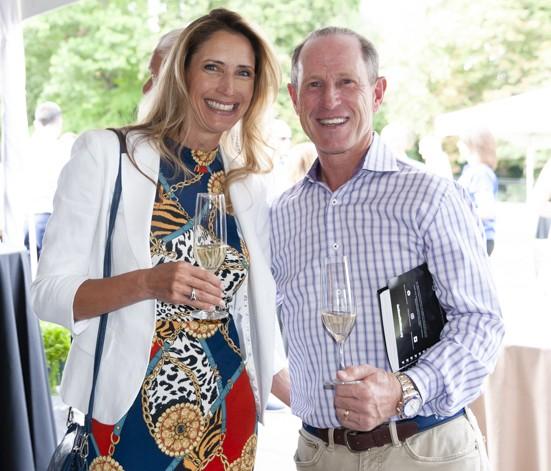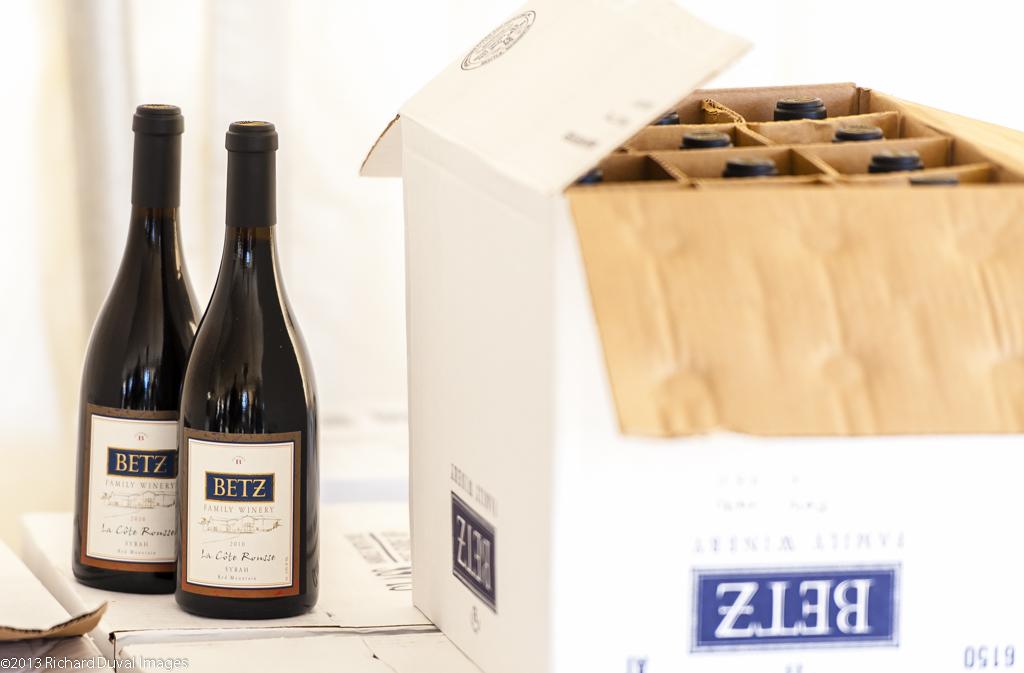
WOODINVILLE, Wash. — Smoke from West Coast wildfires adversely affected grapes for Betz Family Winery, so rather than damage the reputation of their famous winery, owners Steven and Bridgit Griessel informed customers they will not release wines from the 2020 vintage.
“We never considered for one second sending wines to customers that are flawed,” the Griessels wrote Great Northwest Wine. “While it is brutal to have to do this, the decision was easy.”
The natives of South Africa, who purchased the winery from Bob and Cathy Betz in 2011, also announced they will not release 2020 wines under the SuNu brand, their young project featuring vineyard-designated Pinot Noir from Oregon’s Willamette Valley.
In Washington, the Griessels and winemaker Louis Skinner work with some of the state’s most famous vineyards and skilled viticulturists — a list developed by Betz, a Master of Wine who continues to consult at the winery he founded in 1997 as his storied career with Ste. Michelle Wine Estates was winding down.
Historically, Betz and Skinner have pulled heavily from the Yakima Valley and sources have included Kiona plantings on Red Mountain and Boushey, DuBrul, Olsen, Red Willow and Upland in the Yakima Valley. Not all of those sites sold fruit to the Griessels in 2020.
“Washington wineries are constantly testing, evaluating and monitoring their wines throughout the winemaking process,” said Steve Warner, President of the Washington State Wine Commission. “At this point, we can confidently state that smoke impact is not widespread in the 2020 wines. Any impact is isolated to specific areas or varieties. Each grape variety has different sensitivities to smoke impact, so just because one variety is affected, others may not be.
“These are individual business decisions, but generally, if smoke is found to be dominant in a specific lot of wine, that wine will not be released,” Warner added. “The vast majority of Washington wineries will release their 2020 wines, and consumers should be confident that any wines being sold are of the same high quality they always expect out of Washington wines.”
Betz decision to create concern among others

Undoubtedly, winemakers and winery owners who pulled fruit from any of those renowned sites in 2020 will take notice of Tuesday’s announcement by one of the Northwest’s most respected brands.
“We have tasted these wines behind the scenes with growers and other wineries,” the Griessels said. “We will certainly keep doing that so we can all learn.”
During some recent vintages, fears of releasing smoke-affected wines were given as reasons for West Coast winemakers to reject grape deliveries from growers. Last year, some producers in Washington cited the string of mid-October freeze events and turned down frost-affected grapes.
As harvest approached in 2020, there were uncertainties about how much the grapes and resulting wines would be affected by smoke from wildfires. The long-term relationships that the Griessels have with their growers prompted them to honor those vineyard contracts.
“We decided not to reject any of the fruit as we felt it would be unfair to our growers since we could not be sure whether the grapes were ‘smoke tainted,’ ” the Griessels said.
So the grapes arrived at their Woodinville winery. In the short term, results varied and were unpredictable.
“Every lot was assessed from the time they got to the winery,” the Griessels said. “Some grapes did smell of smoke and others did not. Growers have been careful about picking, and some had washed the grapes. All fermentations were checked on a daily basis, and some displayed muted tones, but there were no overt smoke taint tones.”
Eventually, Betz Family Winery received data from ETS Laboratories, which has its headquarters in California’s Napa Valley.
“We sent every lot to ETS for smoke taint markers, but ETS had 8,000 samples ahead of us so it took approximately eight weeks to get the results,” the Griessels said. “All lots had varying levels of compounds associated with smoke taint. It was only directly after malolactic fermentation that every lot displayed smoke taint markers to varying degrees.”
In most cases, the growers came back to the Griessels and adjusted fees to help Betz Family Winery.
“We did Zoom calls with each of our growers once we had done the sensory analysis and confirmed the presence of smoke taint. All growers were empathetic,” the Griessels said. “The vast majority of growers said they were willing to share the pain with us. The growers do not have crop insurance once the grapes are picked so this was enormously helpful to Betz Family, and we are truly grateful for the deep partnerships we have with them.”
First pandemic, then wildfire smoke in 2020

Last year, the Griessels looked to pare down their annual production of 7,000 cases at Betz Family Winery as a result of the pandemic and the devastation enveloping the restaurant industry.
“We had planned a smaller harvest for 2020 due to the loss of our restaurant customers,” they said. “This was tough for us and most small producers. Fortunately our direct-to-consumer business remained at similar levels to 2019.”
Some producers, particularly those during the fire-plagued 2017 vintage, bottled some of their smoke-affected wines and used them to teach their fans a story or two about that harvest or Mother Nature’s impact on a wine.
In recent years, Washington State University and the University of California-Davis have been conducting research on the short-term and long-term effects of the wildfires on vineyards, grapes and resulting wines. The Griessels feared what they would eventually find in bottled wines from the 2020 vintage.
“These flaws can range from barely perceptible to severely off-putting and can stay latent in barrel or bottle for months, sometimes even years, before revealing their full impact,” the Griessels explained to customers. “Not much is known about the exact mechanisms of smoke taint. Researchers at both WSU and UC Davis are working hand-in-hand with wineries and growers to learn more about how smoke taint develops, what can be done to protect vineyards that might be exposed to wildfire particulates, and how to mitigate the damage once the exposure has happened.”
Woodward Canyon Winery in Walla Walla decided not to produce its famous Old Vines Dedication Series Cabernet Sauvignon from the 2010 vintage because the cool growing season did not yield lots of Cab that met the standards of founding winemaker/owner Rick Small. However, those barrels were merely declassified, not discarded as the Griessels plan to do at Woodward Canyon.
“Our team has been hopeful since harvest that certain lots might be salvageable, but after countless hours of evaluation, we believed this was our only option,” the Griessels said. “The idea that we would release any wine that we had reservations about, or that a wine we released might start to develop deepening smoke taint indicators post-bottling, was something we just couldn’t stomach.
“In the end, our commitment to quality is paramount and something we cannot compromise.”

overcompensating?